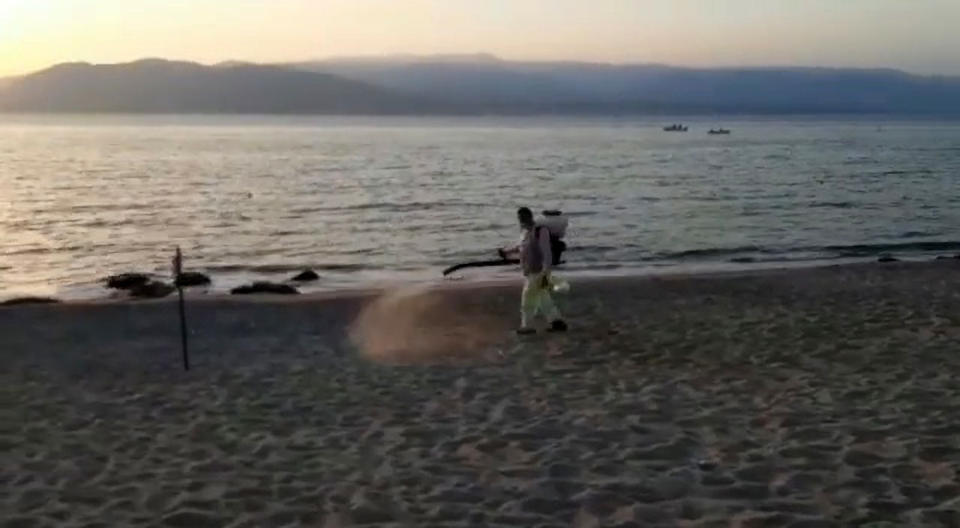Coronavirus: Mayor's 'dangerous' beach act despite WHO warning
An Italian mayor is refusing to back down after ordering council staff to disinfect beaches despite the World Health Organisation warning it could be dangerous and brings little benefit.
Mayor Cateno De Luca, who is in charge of the seaport of Messina in Sicily – the third-largest city on the island, ordered the disinfectant sprayers onto the beaches in a bid to tackle the spread of the coronavirus.
However, WHO has advised disinfecting porous surfaces such as roads, and indeed beaches, is not only useless, but it could also be harmful to humans as it could cause damage or irritation to the eyes, respiratory tract and skin.

Local environmental organisation Legambiente Messina has written to the council demanding to know what products are being used for the sterilisation procedure, and what testing was done to make sure it was safe to be around humans.
Yet despite widespread criticism on social media, Mr De Luca, 48, has declared the beaches "COVID free", blaming the criticism on disgruntled political opponents.
In a statement addressed to the former councillor of the Accorinti junta, Guido Signorino, he said: "I understand that seeing the Messina beaches clean, with effective controls, walkways for the disabled and showers, can disturb the sleep of some former administrators, who now he fiddles with his mobile phone to drum up sterile criticisms.
"With all due respect to the many do-it-yourself virologists who in the many appearances on TV and in newspapers also contradict themselves, alarming and confusing people, it should be reiterated that the interventions carried out on the beaches of Messina are part of a broader programme of surveillance, extraordinary cleaning, enhancement of services and sanitation.

"For the benefit of the many experts in circulation, we point out the product used on the beaches is classified as 'efficient against various microbes, fungi, amoebas and enveloped viruses such as Sars-Covid 2'."
But WHO says on its website “large-scale spraying or fumigation” of “outdoor spaces” was not recommended.
“Streets and sidewalks are not considered as routes of infection for COVID-19. Spraying disinfectants, even outdoors, can be noxious for people’s health and cause eye, respiratory or skin irritation or damage,” the organisation says.
“This practice will be ineffective since the presence of dirt or rubbish for example, inactivates the disinfectant, and manual cleaning to physically remove all matter is not feasible.
“This is even less effective on porous surfaces such as sidewalks and unpaved walkways. Even in the absence of dirt or rubbish, it is unlikely that chemical spraying would adequately cover surfaces allowing the required contact time to inactivate pathogens.”
– Australscope
Do you have a story tip? Email: newsroomau@yahoonews.com.
You can also follow us on Facebook, Instagram and Twitter and download the Yahoo News app from the App Store or Google Play.




